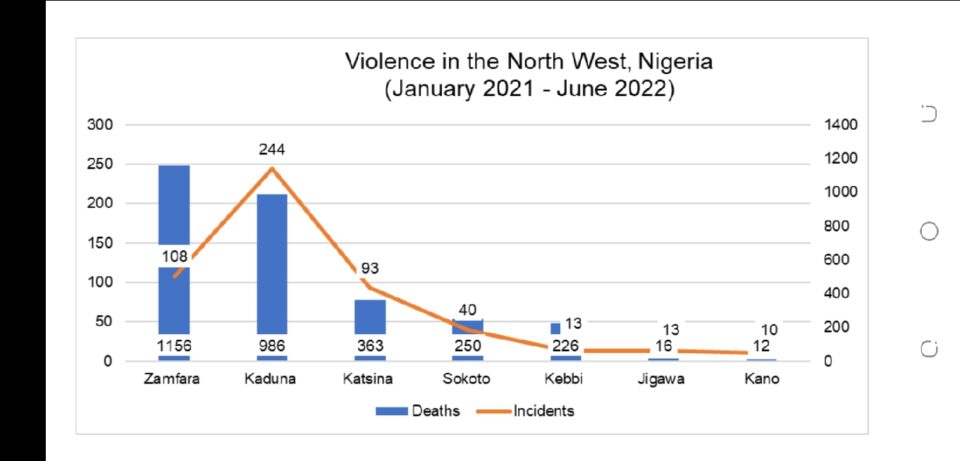By Iro Aghedo, Ndu Nwokolo
Gun violence has become a terrible source of security threat across the world. However, nations respond to the threat posed by firearms abuse differently. For example, following the massacre in an elementary school in Uvalde, Texas, on May 24, 2022, in which 19 children and two teachers were killed, the United States government advocates for stricter gun regulation. In contrast, on account of widespread violent insecurity, the Zamfara State Government, on June 26, 2022, announced its plan to allow residents to bear firearms for self-defence against rampaging bandits. The Zamfara State Commissioner for Information said that the state government had concluded arrangements to distribute 500 forms to eligible persons in each of the 19 emirates in the state to apply for firearms for self-defence.
In addition, the state government established a secretariat in each emirate to collect intelligence about bandits and immediately recruited 200 Community Protection Guards in each of the 19 emirates. To give legal backing to these measures, the state House of Assembly passed an executive bill on June 28, 2022, to prohibit banditry, cattle rustling, kidnapping, cultism, terrorism and other crimes in the state. However, while many people have applauded the call for Zamfara residents to bear firearms as long overdue, several others, including top military officers such as the Chief of Defence Staff, Lucky Irabor, are opposed to the proposal. In May 2019, President Buhari had, through an executive order, placed an embargo on the issuance of firearms licence in the country. Thus, this edition of Nextier SPD Policy Weekly examines the firearms possession debate, pointing out the way out of the imbroglio.
INGLORIOUS REIGN OF BANDITRY:
The policy proposal for Zamfara state residents to bear firearms for self-defence did not come out of the blue. In the last couple of years, residents in Zamfara rural communities have suffered incessant bandits’ violent attacks. Killings, kidnappings, and cattle rustling have become the rule rather than the exception. Data from the Nextier Violent Conflict Database shows that between January 2021 and June 2022, there were 521 violent incidents and 3,009 violent deaths in Northwest Nigeria.
A further breakdown indicates that Zamfara state recorded 108 violent incidents and 1,156 deaths while Kaduna state recorded 244 incidents and 986 deaths(See figure 2). Insights from the Database reveal that while Zamfara recorded the most violent deaths, Kaduna recorded the most violent incidents. During the period under review, over 911 persons, including women, and school children, were abducted by the bandits.
On February 26, 2021, 317 female students were kidnapped from Girls Secondary School Jangebe, Zamfara State, in an early morning raid by bandits. While one of the students died, the rest were later released after negotiations. Efforts by the federal and state governments to secure lives and properties in Zamfara state have not been successful. The unrelenting violent attacks by bandits have forced thousands of residents to flee their homes, abandoning schools, farms and other sources of livelihood. In the past, the state government had suspended telecommunications services and shut petrol stations and markets in response to banditry. The state government even went to the extent of entering a peace deal with the bandits—all to no avail.
THE DILEMMA OF RESIDENTS BEARING FIREARMS:
The call for some Zamfara residents to bear firearms in self-defence is a desperate proposal to save the state from the brink of collapse. Trotter (2018) argues that firearm bearing can be an effective ‘equaliser’ in violent situations. However, no matter how well-intentioned, such proposals have come under intense criticism as currently playing out in the United States of America and Zamfara State in Nigeria. In Zamfara, members of the opposition party, the People’s Democratic Party (PDP), which the state Governor Bello Matawalle defected from in 2021, argued that the call for residents to bear firearms is an abdication of government responsibility. According to the Zamfara State PDP’s secretary Faruku Ahmed, “we fault Zamfara State and the Federal Government for shifting such constitutional responsibility to ordinary citizens. It is the sole responsibility of both the state and federal governments to protect the lives and property of the citizenry”.
In a similar opposition, the Chief of Defence Staff, Lucky Irabor, said that “I do not also think that the governor has the power to instruct the Commissioner of Police to issue licenses, because the Commissioner of Police does not have the powers to issue licenses”. These oppositions further reveal the “toothless-bull-dog position of Nigerian state governors who are constitutionally referred to as the ‘Chief security officers of the state’ and yet lack policing powers in their respective states” (Personal communication). As a result, the governors have sought alternative policing measures for their states. In August 2021, Governor Aminu Bello Masari of Katsina State asked vulnerable residents to bear arms against rampaging bandits. Even Kaduna State Governor Nasir Ahmed El-Rufai had recently advocated the engagement of foreign mercenaries in tackling violent insecurity.
Moreover, Governor Ortom of Benue State had signed a law seeking to arm Volunteer Guards in the state. The state governors remain between the devil and the deep blue sea: their states are under an immense security threat. Nevertheless, the federal government, which cannot guarantee effective public safety across the federation, is arguably opposed to alternative policing arrangements by state governors.
REFLECTIONS ON THE WAY FORWARD:
As evidenced by the case of Zamfara State, the stalemate over how to police violent insecurity in Nigeria requires effective policy measures to save the country from its predicted collapse.
The conflict situation in Zamfara state is further fuelled by economic issues, which are aided by climatic change and pressure on land as a main factor of production. As the Hausas, mainly sedentary farmers, compete with Fulani herders over arable land, conflicts emerge, thereby polarising former peaceful neighbours and resulting in violence and other forms of criminality. A programme targeting community peacebuilding, reconciliation and stabilisation approaches that will involve rebuilding livelihoods and neighbourliness and establishing a common community security agenda and provision will help in sorting out grievances from greed and criminality and solving the situation from its root causes.
The need for effective decentralisation of police: As has been argued over the years, Nigeria’s centralised policing architecture is not fit for purpose. Besides the inadequate number of police personnel and their poor funding and equipment, the members of the Nigeria Police Force who are posted from one state to the other do not have the required local knowledge to police crime and violence in the areas they are posted as shown by the case of Zamfara State. Thus, policing powers, authorities, and the issuance of firearms licenses need to be devolved to sub-national units for better policing of their domains where they have good knowledge of the territories, culture and people.
THE IMPERATIVE OF FEDERAL-STATE COLLABORATION:
Nigeria’s federal and state governments often engage in conflict relations rather than collaboration in internal security management policies. As played out during the formation of the Western Nigeria Security Network (code-named Amotekun) in the South-West and Ebube-Agu Security Network in the South-East, both federal and state governments should stop engaging in unnecessary conflicts over which level of government has power over what security matter. Instead, both levels of government should accord security threats enormous collaborative efforts rather than inter-government rivalry as it is currently playing out in Zamfara State.
The need for more proactive engagement rather than reactive force: The identity and grievances of the perpetrators of violent insecurity, including massacres, kidnapping, and cattle rustling in Zamfara State and the wider North-West region, can be easily accessed through cleric leaders such as Sheikh Abubakar Gumi who has visited them in their hideouts. Also, a peace deal was extended to some of the kingpins and foot soldiers of banditry in the past. Thus, there is a need for group grievances to be peacefully investigated and addressed in the early stage of conflict formation rather than trying to deploy brutal force to mitigate the violence at the full-blown stage. Therefore, some of the newly recruited Community Protection Guards (CPGs) can be engaged as local peace actors who can gather intelligence and report group grievances to traditional institutions and formal authorities as an early warning system. However, the CPGs should be strictly monitored so that they will not be used by the ruling party in the state to perpetuate political violence.
POLICY RECOMMENDATIONS:
1. There is a need for programmes targeting community peacebuilding, reconciliation and stabilisation approaches that will involve rebuilding livelihoods and neighbourliness.
2. Policing powers, authorities, and the issuance of firearms licenses need to be devolved to sub-national units.
3. The federal and state governments should stop engaging in unnecessary conflicts over which level of government has power over what security matter.
4. There is a need for more proactive engagement rather than reactive force.
CONCLUSION
The face-off between the federal and Zamfara State governments over who has the constitutional power to address escalated banditry in the sprawling communities in the state has again brought to the fore the need to decentralise Nigeria’s policing architecture. In addition, both levels of government should collaborate more in addressing the security needs of Nigerians rather than engaging in undue conflicts over security rights. Besides, there is a need for more proactive engagement in the formative stage of conflict rather than resorting to reactive force after the outbreak of armed violence.
(Dr. Iro Aghedo is an Associate Consultant at Nextier SPD and a Senior Lecturer, Department of Political Science, University of Benin, Edo State, Nigeria. Dr. Ndu Nwokolo is a Managing Partner and Chief Executive at Nextier SPD and an Honorary Fellow, School of Government and Society, University of Birmingham, UK.)



